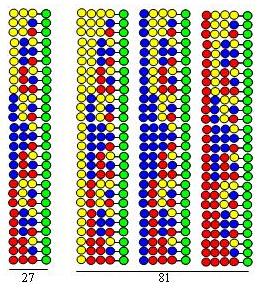Combinatorial chemistry
Combinatorial chemistry is a technique in chemistry that allows the rapid synthesis or the computer simulation of a large number of different but structurally related molecules or materials. This approach is widely used in the field of medicinal chemistry for the synthesis of new drugs, in materials science for the development of new materials with unique properties, and in chemical biology for the study of biological processes. The essence of combinatorial chemistry is to create a large library of compounds by combining sets of building blocks in every possible way. This method contrasts with the traditional approach of synthesizing compounds one at a time.
History[edit | edit source]
The concept of combinatorial chemistry emerged in the late 1980s and early 1990s as a response to the need for more efficient methods of synthesizing large numbers of compounds for drug discovery. The initial focus was on peptide chemistry, but the approach quickly expanded to include other types of chemical entities.
Principles[edit | edit source]
Combinatorial chemistry relies on the principle of creating a large library of compounds by systematically combining sets of building blocks. This can be achieved through Solid-phase synthesis, where the molecules are anchored on a solid support and reacted with building blocks in a stepwise manner, or through solution-phase synthesis, where reactions are carried out in a liquid medium.
Techniques[edit | edit source]
There are several techniques associated with combinatorial chemistry, including:
- Split-and-pool synthesis: A method where a mixture of building blocks is divided (split) into separate reactions, each of which is then reacted with a different building block. The products are then pooled together and the process is repeated.
- Parallel synthesis: A technique where multiple reactions are carried out simultaneously under the same conditions, each reaction containing different building blocks.
- Solid-phase synthesis: A method where molecules are anchored on a solid support, allowing for easy separation of the product from the reaction mixture.
Applications[edit | edit source]
Combinatorial chemistry has found applications in various fields, including:
- Drug discovery: The technique is used to generate large libraries of compounds for high-throughput screening against biological targets.
- Materials science: Combinatorial approaches are used to discover new materials with desirable properties, such as high strength, thermal stability, or specific electronic characteristics.
- Chemical biology: Combinatorial libraries are used to study biological processes and to identify molecules that can modulate biological pathways.
Challenges and Future Directions[edit | edit source]
While combinatorial chemistry has revolutionized the field of drug discovery and materials science, it also presents challenges. The sheer number of compounds that can be generated requires sophisticated methods for library screening and analysis. Additionally, the quality and diversity of the chemical libraries are crucial for the success of combinatorial approaches. Future directions in combinatorial chemistry involve the integration of computational methods to predict the properties of library members and the development of more efficient screening techniques.
Search WikiMD
Ad.Tired of being Overweight? Try W8MD's physician weight loss program.
Semaglutide (Ozempic / Wegovy and Tirzepatide (Mounjaro / Zepbound) available.
Advertise on WikiMD
|
WikiMD's Wellness Encyclopedia |
| Let Food Be Thy Medicine Medicine Thy Food - Hippocrates |
Translate this page: - East Asian
中文,
日本,
한국어,
South Asian
हिन्दी,
தமிழ்,
తెలుగు,
Urdu,
ಕನ್ನಡ,
Southeast Asian
Indonesian,
Vietnamese,
Thai,
မြန်မာဘာသာ,
বাংলা
European
español,
Deutsch,
français,
Greek,
português do Brasil,
polski,
română,
русский,
Nederlands,
norsk,
svenska,
suomi,
Italian
Middle Eastern & African
عربى,
Turkish,
Persian,
Hebrew,
Afrikaans,
isiZulu,
Kiswahili,
Other
Bulgarian,
Hungarian,
Czech,
Swedish,
മലയാളം,
मराठी,
ਪੰਜਾਬੀ,
ગુજરાતી,
Portuguese,
Ukrainian
Medical Disclaimer: WikiMD is not a substitute for professional medical advice. The information on WikiMD is provided as an information resource only, may be incorrect, outdated or misleading, and is not to be used or relied on for any diagnostic or treatment purposes. Please consult your health care provider before making any healthcare decisions or for guidance about a specific medical condition. WikiMD expressly disclaims responsibility, and shall have no liability, for any damages, loss, injury, or liability whatsoever suffered as a result of your reliance on the information contained in this site. By visiting this site you agree to the foregoing terms and conditions, which may from time to time be changed or supplemented by WikiMD. If you do not agree to the foregoing terms and conditions, you should not enter or use this site. See full disclaimer.
Credits:Most images are courtesy of Wikimedia commons, and templates, categories Wikipedia, licensed under CC BY SA or similar.
Contributors: Prab R. Tumpati, MD





